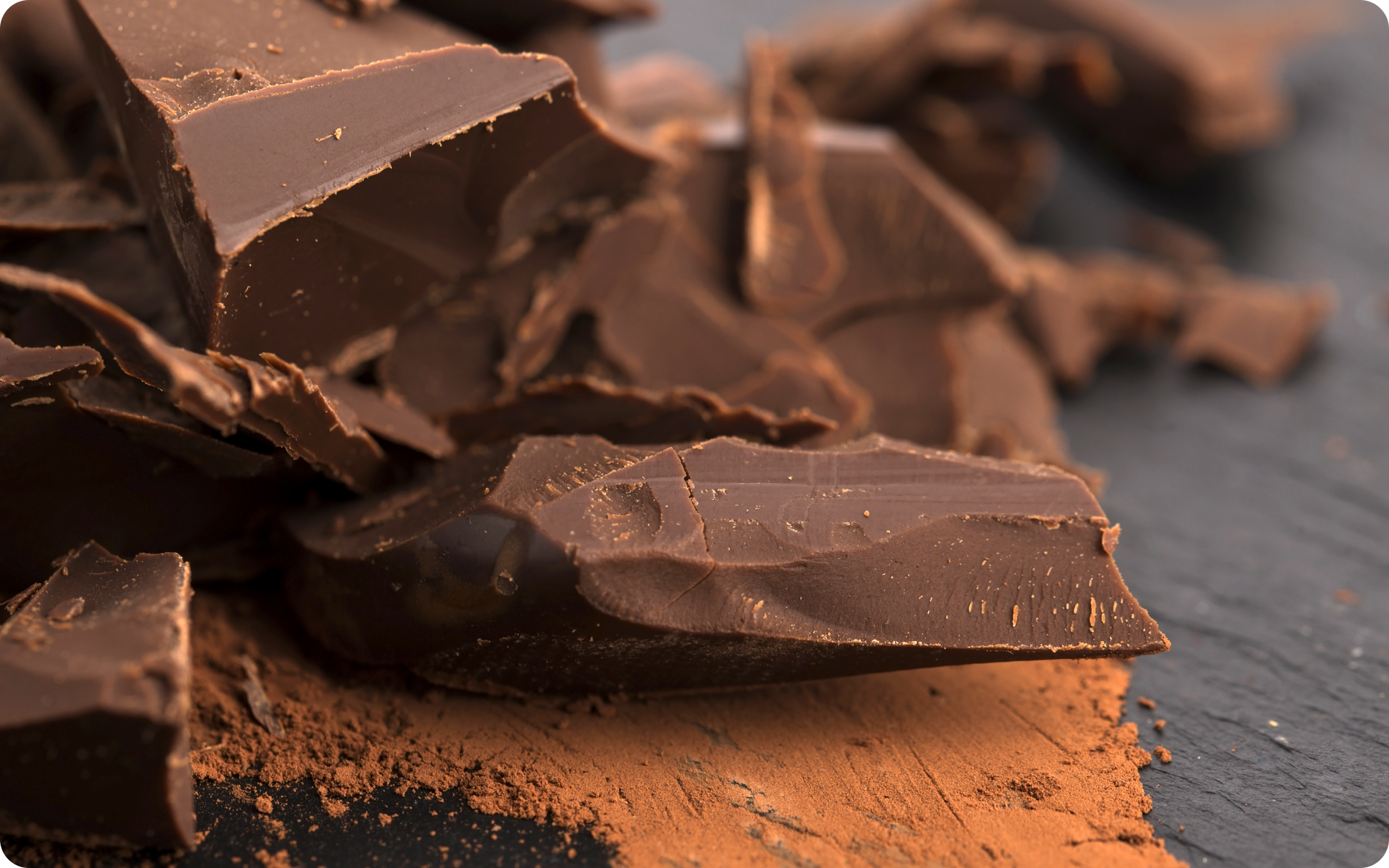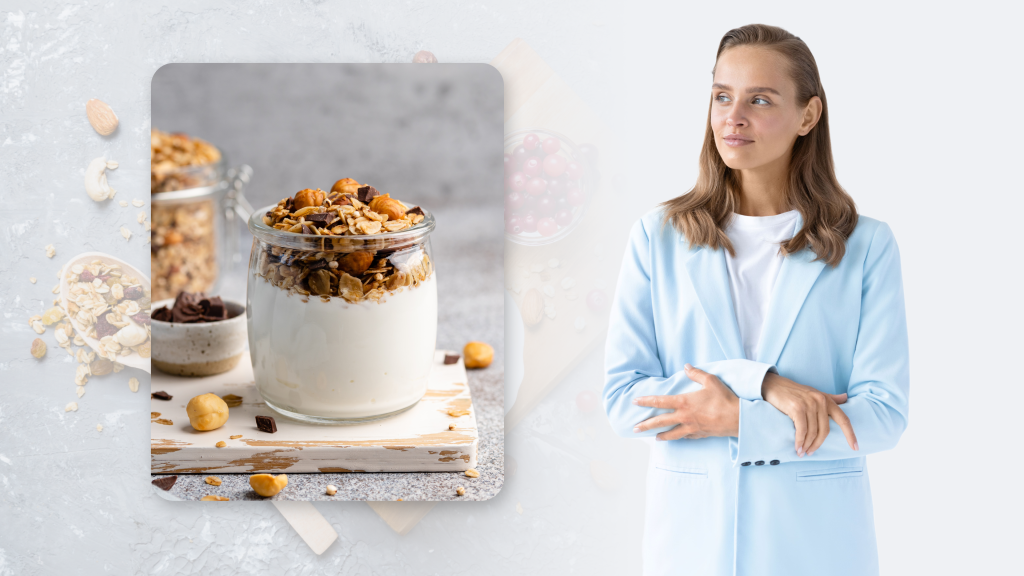Every once in a while, we find reasons to eat some chocolate – as dessert, gift ideas, and even a snack when traveling or working. While it’s considered a snack, chocolate is also rich in healthy nutrients, in addition to sugar and fat.
Cocoa beans have been found to be rich in flavonoids whose anti-oxidation properties reduce the occurrence of cell damage, which is the main cause of heart disease (1).
Reports indicate that it can be a healthy food choice if consumed in moderation (2). Cocoa powder has high caffeine levels that may negatively impact your sleep if consumed before bedtime.
Are There Side Effects to Eating Chocolate Before You Go to Bed?
While it’s a great idea to get into the habit of consuming chocolate to tap into its benefits, eating dark chocolate before bed should be a no-no (3).
-
Poor Sleep
Approximately 33 – 50% of the adult population has been reported to experience symptoms of insomnia (4).
An adult requires 8 hours of quality sleep for their body to operate optimally, and this sleep requirement drops slightly with age. This recommendation is per the National Sleep Foundation (NSF) recommendations that have study results indicating that people over 65 experience the highest rate of sleep difficulty (5).
While depression, emotional turmoil, and terminal illness are top on the list of factors for inadequate sleep, consumption of caffeine-rich food before sleep is also a culprit (3).
So, why does eating chocolate before bed make me stay awake? It’s because the caffeine you have ingested stimulates your brain and prevents it from shutting down, even though you’ve gotten into bed. To avoid going through this, stop eating foods or drinking beverages with caffeine at least a few hours before you sleep (3).
-
Potential for Nightmares
Did you know that sugary foods can increase your chances of having nightmares?
According to study results published by Frontiers in Psychology, 31% of study participants reported having disturbing dreams every time they ate foods rich in sugar, such as chocolate, cake, and candy, right before sleeping (6).
The effects were more severe for those who ate white chocolate before going to bed. Therefore, eating white chocolate before bed is not a good idea (6).
-
Poor Dental Hygiene
Regardless of whether sweet food is eaten in its natural state or after processing, it contains sugar, which can damage your teeth (7). Tooth decay is particularly common for people who love taking sugary snacks before they go to sleep (8).
Although all chocolate types contain some refined sugars, white chocolate has a very high sugar content. Therefore, it’s bad for your teeth to eat white chocolate before bed, even though some people argue that if they brush their teeth, it’s not a problem.
Chocolate is best eaten alongside other foods so that food fiber can help neutralize the sugar and remove it from the teeth cavities (9).
-
Gastric Discomfort
Can eating chocolate before bed make you feel bad in the morning? Yes! Every time you swallow food, it travels down the gut and lands in the stomach, all the way being guided by strong muscles that contract and expand to allow the food through.
At the opening of the stomach after the mouth is a muscle, the esophageal sphincter, which functions as a valve and locks in food that has been deposited into the stomach (10). If this muscle malfunctions, a mixture of food and digestive acids can come up the esophagus.
This irregular backward flow of food results in a burning sensation in the chest and throat area that is simply referred to as heartburn (11).
Heartburn is common at night when the body is in rest mode as the body is in horizontal alignment instead of during the day when it is vertical. While there are major risk factors for heartburn at night, including stress, obesity, alcohol consumption, and overeating, many people experience heartburn during sleep after eating chocolate foods (12).
BetterMe app will kick you out of the mental funk, shake off your extra weight, rid you off your energy-zapping habits, and help you sculpt the body of your dreams. Intrigued? Hurry up and change your life for the better!
What Is the Best Time to Eat Chocolate?
Eating chocolate in the morning can provide a quick boost of energy due to its caffeine content. It also contains flavonoids, which have been shown to improve cognitive function and mood (13). Starting your day with a small piece of dark chocolate may help you feel more alert and focused.
The afternoon is another popular time to enjoy chocolate, particularly as a midday pick-me-up. Dark chocolate interacts with serotonin and dopamine, which can help improve mood and reduce stress (14). This makes it a great snack option during a hectic workday or when you’re feeling tired.
It’s worth noting that consuming too much chocolate, particularly late in the afternoon, may disrupt sleep patterns due to its caffeine content (15). So if you’re sensitive to caffeine or have trouble sleeping, it may be best to limit eating chocolate before bed or in the afternoon.
Read more: Vegan Chocolate: Where Ethics Meets Indulgence
What Other Foods Should You Avoid Eating Before Bed?
Avoid eating the following foods before bed to get a good night’s sleep:
- Spicy foods: Spices can cause heartburn and disrupt your sleep (16).
- Fatty or fried foods: These take longer to digest and can cause discomfort while trying to sleep (16).
- Caffeine: This stimulant can keep you awake and make it difficult for you to fall asleep (15).
- Alcohol: While it may initially make you feel drowsy, alcohol can disrupt your sleep cycle and lead to poor quality of sleep (16).
- Sugary snacks: High amounts of added sugar in your diet and eating sugary snacks before bed can spike your blood sugar levels and make it difficult for you to fall asleep (17).
- Heavy meals: Eating a large and heavy meal close to bedtime can cause discomfort and lead to indigestion (18).
- Citrus fruits: These contain high levels of acid, which can cause heartburn and gastroesophageal reflux and may disrupt your sleep (19).
6 Foods You Should Eat Before Bed
On numerous occasions, sleep and nutrition experts have come together to uncover the mystery of insomnia (20). While every individual has their own routine and diet that will get them to sleep fast and better, the following foods have been found to offer similar results for many people:
Kiwi Fruit
This hairy-looking, oval fruit is grown in plantations worldwide, but its origins can be traced to New Zealand. The fruit is available in either gold or green varieties and is rich in vitamin C, vitamin E, folate, and potassium (21).
Recent study results suggest that kiwi fruit improves sleep (22); eat two kiwi fruits an hour before bedtime and experience faster, heavier, and higher-quality sleep.
The ability of the kiwi fruit to induce sleep can be attributed to its antioxidants. Kiwis also minimize the effects of folate deficiency (21).
Tart Cherries Fruit and Juice
Unlike the majority of cherries that have a sweet flavor, tart cherries taste sour. When you go to the grocery store, you’ll find this fruit in cultivators from Montmorency, English MMorello, or Richmond.
Studies indicate that tart cherry juice is highly beneficial when it comes to sleep matters. A single cup of this juice taken a few minutes before bedtime can lead to longer sleep time and better quality sleep (23).
The success of tart fruit and juice in inducing sleep stems from the fact that they contain melatonin in high concentration. Melatonin is the hormone that promotes sleep and maintains the sleep pattern of an individual (20).
Night-Milked Milk
It has been discovered that milk taken from cows at night contains higher melatonin levels compared to that taken during the day (24).
The aforementioned is a natural sleep inducer for those who have trouble falling and sleeping well.
Previous studies have also shown that a glass of milk consumed right before bed causes the consumer to sleep for extended periods without interruptions (25).
Another milk form to consider before sleeping is malted milk, which results from mixing regular milk with powdered wheat, powdered barley, sugar, and vitamins (26).
Fatty Fish
In a study on the effects of fish-rich diets conducted for over eight months, it was found that better sleep could be achieved by eating fatty fish at dinner time.
During the study period, it was discovered that if someone ate salmon a minimum of 3 times per week, they generally experienced better sleep, which trickled over to their daily performance (27).
The conclusion reached by the researchers was that the omega-3 -3 oils and vitamin D contained in fish helped the body regulate the production of serotonin. When fish consumption was a bit diminished in winter, participants reported problematic sleep (27).
Nuts
There are many nut types such as almonds, walnuts, cashews, and pistachios that are typically healthy dietary fats and oils.
One study found that consumption of walnuts increases the level of melatonin, which improves sleep quality and reduces daytime sleepiness (28).
As the nutritional value of each of the nut classes varies, it’s essential to eat the correct amount to obtain the right amount of melatonin flowing in the blood.
Rice
Studies have found a direct correlation between eating high glycemic index carbohydrates and falling asleep easily (29).
A study of participants from Japan found that people who consumed high-GI rice fell asleep faster than those who opted for low-GI rice. The high glycemic index that was achieved in the first group was considered a major factor supporting why they fell asleep more easily (29).
Lean and toned up body isn’t just a far-fetched fantasy. Check out the BetterMe app and watch it propel your weight loss journey into high gear!
FAQs
What time is too late to eat chocolate?
Experts recommend avoiding any sources of caffeine for at least six hours before bedtime if you want to ensure a good night’s sleep (15). This includes chocolate, coffee, tea, and energy drinks.
Chocolate contains caffeine and theobromine, two stimulants that can affect the body’s internal clock and interfere with sleep patterns. This is because they both increase alertness and stimulate the central nervous system (13). So, if you consume chocolate too close to bedtime, it could ultimately disrupt your sleep cycle and leave you feeling restless at night.
However, this timeline can vary for different individuals. Some people may be able to consume chocolate later in the evening without experiencing any negative effects on their sleep, while others may need to cut it off earlier.
You should consider the type of chocolate you’re eating. Dark chocolate contains a higher amount of caffeine and theobromine than milk or white chocolate (30), so it may have a stronger impact on your body’s internal clock. And of course, the more chocolate you eat, the greater the chances of experiencing sleep disturbances.
Will I gain weight if I eat chocolate at night?
Eating chocolate at night can contribute to weight gain, but it depends on various factors such as the amount of chocolate consumed and overall diet and exercise habits (31).
As with any food, consuming excessive amounts of chocolate can lead to weight gain. A single serving size of chocolate is typically 1 ounce or 28 grams. If you’re eating more than this amount at night, it could contribute to weight gain over time.
However, if you’re mindful of your portion sizes and stick to a reasonable serving size, indulging in some chocolate at night may not have a significant impact on your weight.
If you consume a healthy and balanced diet throughout the day and regularly engage in physical activity, enjoying some chocolate at night may not have a significant effect on your weight.
However, if you consistently consume high-calorie foods and lead a sedentary lifestyle, eating chocolate at night could contribute to weight gain. It’s all about balance and moderation in your overall eating habits.
What happens to your body if you eat chocolate every day?
Eating chocolate every day can have either a positive or negative effect on your body, depending on how you go about it (32).
Eating chocolate every day can be good for you if:
- You choose dark chocolate with a high cocoa content (70% or higher). Dark chocolate contains antioxidants and can help improve heart health (14).
- You stick to moderate portion sizes (1 ounce or less).
- You incorporate it as part of an overall balanced and healthy diet.
- You limit your daily calorie intake and stay within a healthy weight range.
- You eat a small portion of dark chocolate to satisfy your sweet tooth, rather than consuming high-calorie desserts or snacks.
However, eating chocolate every day can be harmful if:
- You consume large quantities of milk chocolate or other highly processed and sugary chocolates.
- You exceed your recommended daily calorie intake.
- You have pre-existing health conditions that require you to limit your sugar and fat intake.
- You use chocolate as a coping mechanism for stress or emotions, leading to overconsumption.
- You neglect other important nutrients and food groups in your daily diet.
- You experience negative side effects from eating chocolate, such as migraines or digestive issues.
Is eating before bed bad for your heart?
Research has suggested that eating too close to bedtime can negatively impact cardiovascular health (33). Here are some reasons why:
Disrupts Sleep
Eating right before bed can disrupt your sleep patterns. When you eat food, your body begins the digestive process, which requires energy and increases your body temperature. This rise in energy and body temperature can make it difficult to fall asleep or stay asleep, leading to poor-quality sleep. In the long term, this can have negative effects on your heart health as sleep is essential for proper functioning and repair of the cardiovascular system (34).
Increases Blood Pressure
Eating a large meal right before bedtime can cause an increase in blood pressure. This is because the body needs to work harder to digest food while lying down, leading to higher blood pressure levels (35).
Consistently elevated blood pressure levels can put a strain on your heart and contribute to the development of cardiovascular diseases (36).
Contributes to Weight Gain
As previously mentioned, consuming excess calories from late-night snacking can lead to weight gain over time (37).
Obesity is a known risk factor for heart disease and can increase the chances of developing other health issues such as high blood pressure, diabetes, and high cholesterol (38).
Eating Chocolate Before Bed: The Bottom Line
Chocolate is a sugary food, and while we will always find an excuse to eat it any time of the day, it’s important to consider factors such as how much you’re eating, how long it is before you go to sleep, and how often you indulge.
Sugary foods are high in starch, but that doesn’t make them recommended carbohydrates. More research is needed in this area to distinguish between healthy and unhealthy carbohydrates as far as sleep is concerned.
DISCLAIMER:
This article is intended for general informational purposes only and does not serve to address individual circumstances. It is not a substitute for professional advice or help and should not be relied on for making any kind of decision-making. Any action taken as a direct or indirect result of the information in this article is entirely at your own risk and is your sole responsibility.
BetterMe, its content staff, and its medical advisors accept no responsibility for inaccuracies, errors, misstatements, inconsistencies, or omissions and specifically disclaim any liability, loss or risk, personal, professional or otherwise, which may be incurred as a consequence, directly or indirectly, of the use and/or application of any content.
You should always seek the advice of your physician or other qualified health provider with any questions you may have regarding a medical condition or your specific situation. Never disregard professional medical advice or delay seeking it because of BetterMe content. If you suspect or think you may have a medical emergency, call your doctor.
SOURCES:
- Cocoa and Cardiovascular Health (2009, ahajournals.org)
- Chocolate Consumption and Risk of Coronary Heart Disease, Stroke, and Diabetes: A Meta-Analysis of Prospective Studies (2017, pubmed.ncbi.nlm.nih.gov)
- 12 Foods That Sabotage Sleep (nd. aarp.org)
- Sleep Medicine: Insomnia and Sleep (2019, ncbi.nlm.nih.gov)
- Sleep health and aging: Recommendations for promoting healthy sleep among older adults: A National Sleep Foundation report (2023, sleephealthjournal.org)
- Dreams of the Rarebit Fiend: food and diet as instigators of bizarre and disturbing dreams (2015, academia.edu)
- Sugars and Dental Caries: Evidence for Setting a Recommended Threshold for Intake (2016, ncbi.nlm.nih.gov)
- Sugar before bed: a simple dietary risk factor for caries experience (2017, pubmed.ncbi.nlm.nih.gov)
- Tackling tooth decay (2013, jada.ada.org)
- Anatomy, Thorax, Esophagus (2020, ncbi.nlm.nih.gov)
- Heartburn at night: Causes and remedies (2020, medicalnewstoday.com)
- The relationship of gastroesophageal reflux with nutritional habits and mental disorders (2023, sciencedirect.com)
- The relevance of theobromine for the beneficial effects of cocoa consumption (2015, frontiersin.org)
- Dark chocolate: An overview of its biological activity, processing, and fortification approaches (2022, sciencedirect.com)
- Caffeine Effects on Sleep Taken 0, 3, or 6 Hours before Going to Bed (2014, ncbi.nlm.nih.gov)
- Nutritional Elements in Sleep (2024, ncbi.nlm.nih.gov)
- Relationship Between Added Sugar Intake and Sleep Quality Among University Students: A Cross-sectional Study (2019, ncbi.nlm.nih.gov)
- Associations between bedtime eating or drinking, sleep duration and wake after sleep onset: findings from the American time use survey (2021, ncbi.nlm.nih.gov)
- Dietary Intake in Relation to the Risk of Reflux Disease: A Systematic Review (2021, ncbi.nlm.nih.gov)
- Melatonin and Sleep (2020, sleepfoundation.org)
- The nutritional and health attributes of kiwifruit: a review (2018, ncbi.nlm.nih.gov)
- Acute effects of fresh versus dried Hayward green kiwifruit on sleep quality, mood, and sleep-related urinary metabolites in healthy young men with good and poor sleep quality (2023, frontiersin.org)
- Pilot Study of the Tart Cherry Juice for the Treatment of Insomnia and Investigation of Mechanisms (2018, journals.lww.com)
- Full article: Melatonin concentration in cow’s milk and sources of its variation (2019, tandfonline.com)
- Exploring the Role of Dairy Products In Sleep Quality: From Population Studies to Mechanistic Evaluations (2023, ncbi.nlm.nih.gov)
- Sleep after a bedtime beverage (1972, pubmed.ncbi.nlm.nih.gov)
- Fish Consumption, Sleep, Daily Functioning, and Heart Rate Variability (2014, ncbi.nlm.nih.gov)
- Walnut Consumption Improves Sleep Quality: A Randomized-Controlled Trial (2019, mdpi.com)
- High-glycemic-index carbohydrate meals shorten sleep onset (2007, pubmed.ncbi.nlm.nih.gov)
- Phenolic and Theobromine Contents of Commercial Dark, Milk and White Chocolates on the Malaysian Market (2009, ncbi.nlm.nih.gov)
- Habitual Chocolate Consumption May Increase Body Weight in a Dose-Response Manner (2013, ncbi.nlm.nih.gov)
- Cocoa and Chocolate in Human Health and Disease (2011, ncbi.nlm.nih.gov)
- Dietary circadian rhythms and cardiovascular disease risk in the prospective NutriNet-Santé cohort (2023, nature.com)
- The Health Impact of Nighttime Eating: Old and New Perspectives (2020, ncbi.nlm.nih.gov)
- Timing of Food Intake Drives the Circadian Rhythm of Blood Pressure (2020, ncbi.nlm.nih.gov)
- HIGH BLOOD PRESSURE AND CARDIOVASCULAR DISEASE (2019, ncbi.nlm.nih.gov)
- Meal timing influences daily caloric intake in healthy adults (2014, ncbi.nlm.nih.gov)
- Health Risks of Overweight & Obesity – NIDDK (2023, niddk.nih.gov)











